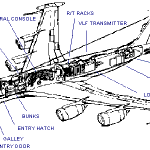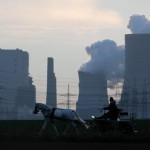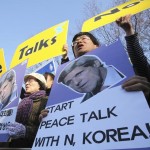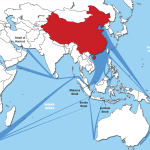- DETERRENCE: What North Korean intelligence listens to
- DPRK: Negotiating with North Korea: 1992-2007
- ENERGY SECURITY: Europe vote sets back carbon plan
- GOVERNANCE AND CIVIL SOCIETY: Hope that Kerry and China can bring N. Korea into dialogue
- CLIMATE CHANGE ADAPTATION: Building resilient coastal communities and ecosystems
- AUSTRAL PEACE AND SECURITY: Planning the unthinkable war: ‘AirSea Battle’ and its implications for Australia
 DETERRENCE: What North Korean intelligence listens to, Mark Ambinder, The Week (5 April 2013)
DETERRENCE: What North Korean intelligence listens to, Mark Ambinder, The Week (5 April 2013)
USAF and US STRATCOM used a new format for Emergency Action Messages just as the DPRK crisis escalated. If you’re North Korea, and you are listening, you’ll notice that your main adversary is no longer communicating with its nuclear forces in the same way. This suggests that something is up.
- North Korea and the fallacy of accidental wars, Robert Farley, The Diplomat (5 April 2013)
- U.S. military chopper crashes near N. Korean border, Yonhap (16 April 16 2013)
- N. Korean defector in South crosses western sea border, Kim Eun-jung, Yonhapm (4 April 2013)
- Border mountains catch fire, Nam Hyun-woo, Korea Times (14 April 2013)
 DPRK: Negotiating with North Korea: 1992-2007, Robert Carlin and John W. Lewis, Stanford Center for International Security and Cooperation, January 2008), [PDF, 1.4 MB]
DPRK: Negotiating with North Korea: 1992-2007, Robert Carlin and John W. Lewis, Stanford Center for International Security and Cooperation, January 2008), [PDF, 1.4 MB]
North Korea’s statements are moderating somewhat and things appear to be escalating at a much slower pace. However, pinpointing the exact cause is difficult since so many different levers were simultaneously pulled. China’s decision to speak authoritatively via the People’s Daily indicated China internationalized issues on the Korean Peninsula and guaranteed South Korea a seat at future talks. North Korea’s rejection of talks is not absolute.
- How to talk to a North Korean, Joel Wit, Foreign Policy Online (20 April 2011)
- Negotiating with North Korea on its Nuclear Program, Robert Gard, Center for Arms Control and Non-Proliferation (28 April 2011)
- Words to four nations over Korean Peninsula Tensions, Hua Yiwen, People’s Daily Overseas Edition (11 April 2011)
 ENERGY SECURITY: Europe vote sets back carbon plan, Stanley Reed, New York Times (16 April 2013)
ENERGY SECURITY: Europe vote sets back carbon plan, Stanley Reed, New York Times (16 April 2013)
So the hot air balloon might be stalled. Some people got tired of paying dearly to watch the spectacle. From some € 25 a ton in 2008, the price of carbon allowances fell to € 7 a ton last year, to around € 3 a ton this past Tuesday, and might fall to the level of late 2001 share prices for Enron, an early promoter of carbon cap-and-trade system. Emissions keep rising, and subsidies to clean energy are being cut. What this portends for the new international climate policy regime, only time will tell. CO2 is just another air pollutant, if that.
- Europe wobbles on green energy costs, Pilita Clark, Financial Times (7 April 2013) *Subscription required
- World climate change goal at risk as emissions surge – UN, Reuters (12 April 2013)
- Clean energy investment falls 22% as subsidy cuts stall projects, Sally Bakewell, Bloomberg’s Business Week (14 April 2013)
 GOVERNANCE AND CIVIL SOCIETY: Hope that Kerry and China can bring N. Korea into dialogue, Park Byong-su, Hankyoreh (16 April 2013)
GOVERNANCE AND CIVIL SOCIETY: Hope that Kerry and China can bring N. Korea into dialogue, Park Byong-su, Hankyoreh (16 April 2013)
US Secretary of State Kerry’s visit to the region has led to hope of relaxed tensions as the US indicated its willingness to meet with the DPRK bilaterally. The DPRK responded that an apology is required before talks between the US and ROK can occur. The shutting down of the Kaesong Industrial Complex is having repercussions for ROK businesses, and some analysts feel it is a push back against the growing exposure of workers to capitalism.
- Kerry says U.S. ready to “reach out” to North Korea, Arshad Mohammed and Kiyoshi Takenaka, Reuters (14 April 2013)
- Pyongyang demands apology before talks, Kim Hee-jin, Joongang Ilbo (17 April 2013)
- Kaesong production halt hits both Koreas, Song Jung-a, Financial Times (12 April 2013)
 CLIMATE CHANGE ADAPTATION: Building resilient coastal communities and ecosystems, NCCARF policy guidance brief 1, NCCARF (2013)
CLIMATE CHANGE ADAPTATION: Building resilient coastal communities and ecosystems, NCCARF policy guidance brief 1, NCCARF (2013)
Around 85% of Australians live within 50 km of the coast. Today, these people are exposed to flood and cyclone damage. Under a changing climate, the potential for damage to homes, infrastructure and ecosystems will be made worse by sea-level rise and inundation, especially in areas where windstorms become more frequent and/or more severe. Adaptation to manage these challenges will be essential.
- NCCARF policy guidance briefs, NCCARF (2013)
- Understanding and projecting sea level change, John A Church et al., Oceanography vol. 24, no. 2, pp. 130–143 (2011) [1.43 MB, PDF]
 AUSTRAL PEACE AND SECURITY: Planning the unthinkable war: ‘AirSea Battle’ and its implications for Australia, Benjamin Schreer, Australian Security Policy Institute (April 2013) [PDF, 2.18KB]
AUSTRAL PEACE AND SECURITY: Planning the unthinkable war: ‘AirSea Battle’ and its implications for Australia, Benjamin Schreer, Australian Security Policy Institute (April 2013) [PDF, 2.18KB]
The implications of AirSea Battle for Australia are far from trivial. After all, this is about a potential military escalation with a major nuclear power. Fully embracing the logic behind AirSea Battle is so far not in Australia’s interests. Openly signing up for the concept would send a strong political message to China that the ADF is now actively planning and equipping for a potential war with the PL A. There’s no need to do so.
- Australia is now a pawn in US-China power plays, Hugh White, The Age (16 April 2013)
- Wars of necessity: naive militarism, Mike Scrafton, The Strategist, ASPI (8 April 2013)
- Singapore urges Obama to take stronger stand in Asia, Howard LaFranchi, Christian Science Monitor, (3 April 2013)
The Nautilus Peace and Security Weekly Report presents articles and full length reports each week in six categories: Austral security, nuclear deterrence, energy security, climate change and security, the DPRK, climate change adaptation and governance and civil society. Our team of contributors carefully select items that highlight the links between these themes and the three regions in which our offices are found—North America, Northeast Asia, and the Austral-Asia region.
Subscribe to NAPSNet to receive free weekly email reports
Editor
Contributors
- Deterrence: Peter Hayes
- Governance and Civil Society: Dyana Mardon, Yi Kiho
- Climate Change Adaptation: Saleem Janjua
- DPRK: Roger Cavazos
- Energy Security: Nikhil Desai
- Climate Change and Security: Richard Tanter

